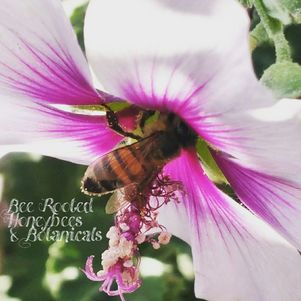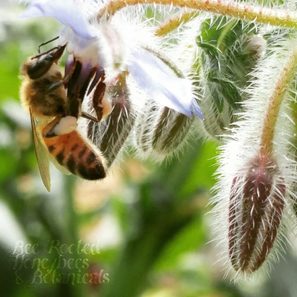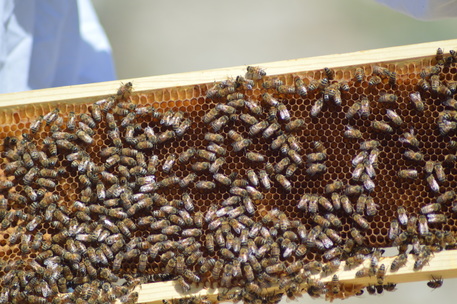Our StoryEvidently there is a saying among beekeepers, "You do not choose to be a beekeeper, the bees choose you." This is true in our case.
A swarm landed in a palm tree at our home. We were so busy that we did not notice until they had already built a hive with comb, brood, pollen, and honey. My one son started screaming and was terrified to go out of the door due to flying bees. Yet, they never caused any problems or bothered us. Not knowing what to do, we called a local beekeeper. They were a nice couple. They came right away to perform a live bee removal. While they were removing them, I was enthralled. I was so mesmerized that I stood there watching without any protective gear....I did not get stung. After they removed the honey comb, I offered it to my children. NO ONE ended up with a stomach ache!!!! I was so impressed that I began researching. I soon discovered that my chemically sensitive family couldn't eat honey because most beekeepers use chemicals in their hives. Even "organic" honey beekeepers must often treat, in case of disease, if the beekeepers want USDA reimbursement for losses. In addition, beekeepers often use "food grade" plastic foundation that still leeches "food grade" chemicals into the honey. We then became active in with Honey Love and the Los Angeles Urban Beekeepers community. We found many wonderful people that wanted to treat the bees like we wanted to keep bees. Soon, we had our first colony! Ever since, we have learned a ton! We love our bees! After awhile, I realized that I wanted to do this professionally. I have enjoyed educating others on bees, especially feral bees. My terrified son has made tremendous progress as well! He is no longer scared of bees! We understand the plight of the bees with the pesticides in our communities as we have felt the devastating effects personally. We want to help them and educate the public about the bees so that people are better equipped to help them. |
|
Our Beekeeping Practices
- We rescue feral swarms and relocate them to hives that meet our standards.
- We DO NOT use any synthetic chemicals: pesticides, fungicides, or antibiotics in our hives.
- We minimally smoke our hives with organic and non-treated botanical substances such as palm branches, lemon balm, coastal hay, etc.
- We abide by the "Live Bee Removal & Best Practices" established by HoneyLove.org, an urban beekeeping non-profit organization dedicated to educating the public.
- We use foundation free frames, allowing the bees to build the cell size they feel they need.
- We choose to requeen hives based on the colony's behavior and NOT based on their genetics. We avoid this if we can by relocating the hive to a less urban area, after working with the hive, to see if their disposition changes over time.


